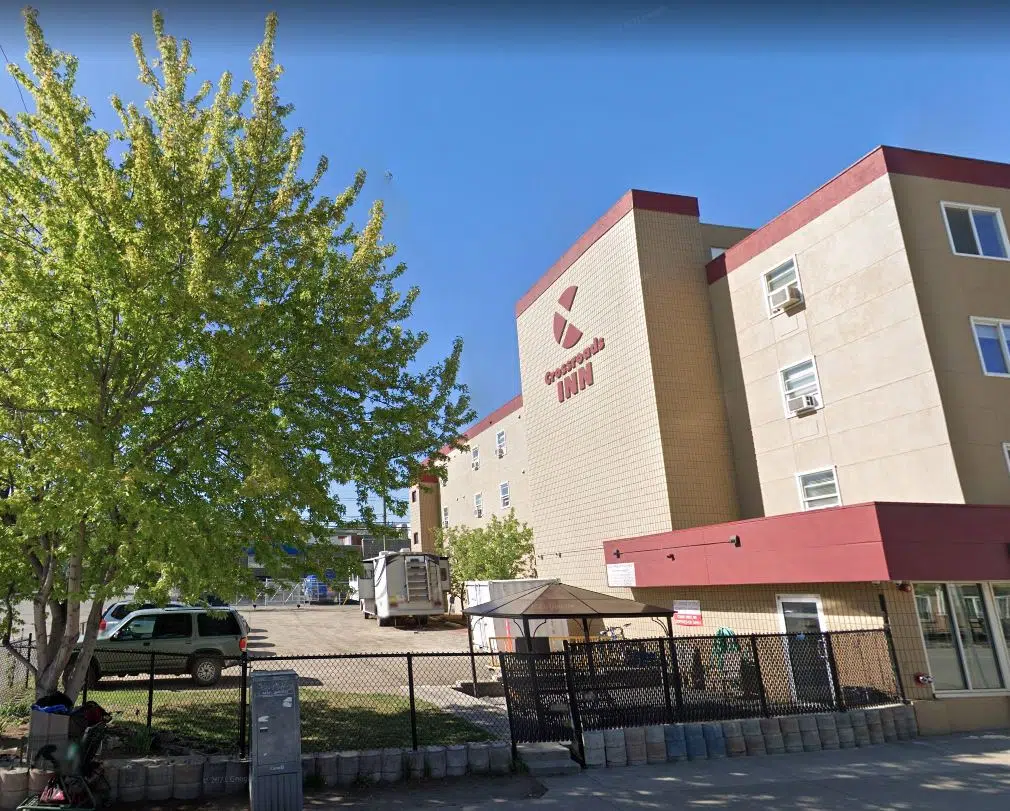
The Crossroads Inn in Kamloops (Photo via Google Maps)
ASK Wellness will operate a pair of temporary 24-hour warming stations in Kamloops next week – one downtown and one on the North Shore.
These warming stations at the Crossroads Inn on Seymour Street and at Spero House on Tranquille Road come as Environment Canada is forecasting overnight lows around – 9 C on Monday through Wednesday, with day time highs around -2 C to -3 C.
Both warming stations will be open from Monday, Nov. 7, through to Friday, Nov. 11, though it is contingent upon staffing and capacity.
Speaking on NL Newsday, CEO Bob Hughes said these are warming stations and not shelters.
“We will not able to provide meals or a full complement of resources, it is simply a place to get out of the cold and a place [for us] to be able to triage a person and find and make sure that every shelter bed is utilized, and to look at what that person uniquely needs,” he said.
The announcement comes one day after The Loop operated as an emergency shelter Thursday night, housing 25 people ranging in age from 19 to 79.
“You know the bottom line, why are we doing this? Our residents should not be forced to live outdoors and sleep outdoors in sub zero temperatures because it is a danger to their life, their health, and their wellbeing, and it impacts our entire city,” the Loop operator, Glenn Hilke told NL News.
Both moves come as the official shelters – Stuart Wood Elementary and the Kamloops Yacht Club – lay empty Thursday night, following a decision late last month by the Canadian Mental Health Association to withdraw its support to run the facilities.
“For any community members who are eager to support the marginalized members of our community during this dangerous time, donations of new or gently used blankets and winter clothing can be dropped off at either of the warming stations, or at ASK’s Housing Outreach Office at 433 Tranquille Road,” ASK Wellness Communications Specialist, Andrina Tenisci, said.
Hughes is also calling on municipal and provincial governments to work together on a solution to house some of the most vulnerable people this winter.
“It is just a tragedy that we’re in a position where we’re entering a winter that approached faster than anyone though it, and we’re now sitting in Kamloops without an operator,” he added.
“That is understandable based on the pressures of the labour market.”
Several Interior shelter operators call for change in open letter
ASK Wellness was also one of a number of social agencies in Kamloops and the Okanagan to sign an open letter to mayors, councils, BC Housing and Interior Health, calling for more resources to help set up more robust shelter facilities.
Other signatories include the Nicola Valley Shelter & Support Society, the John Howard Society of Okanagan & Kootenay, the Penticton and District Society for Community Living, Kelowna Gospel Mission, and the Turning Points Collaborative Society.
In the letter, note they are saying “no more” to “an incomplete continuum of care.”
“For the past several years, the response has been to set up winter mat shelter programs. Many operators have already been asked if we can step up again to run temporary winter shelter programs. This year, many of the operators in Vernon, Penticton, West Kelowna, Kelowna, Merritt, and Kamloops are saying no more,” the letter said.
“The cycle of bringing challenging persons in from the cold, to shelter them in the most basic of temporary shelters, to provide the barest of supports, to make limited investment in health, skills, and real housing; and then to have them exited back to the streets on the first day of spring with a tent and well wishes, has become an exercise in futility at best.”
They do note that while the shelter may provide an escape from the cold, they say “it is a sickeningly purposeless proposition” to consider that a solution to the ongoing humanitarian crisis.
“We are tired of the futility of winter mat shelters. We are tired of seeing no meaningful outcome to the cycle of indoor cold winter shelter and outdoor summer tenting areas,” the letter said.
“We are tired of knowing that the brevity of both the investment and the stay means health will not improve, permanent housing will not materialize, and nothing will change.”
They also note that Interior Health is often “conspicuously” absent, asking that they stop discharging people with unresolved substance use issues and a lack of community health supports from hospitals into shelters.
“Interior Health has passed much of that responsibility to shelter, outreach, and supportive housing operators [and they have] left it to us to handle medication administration, co-morbidities, bathing and hygiene, overdose reversals in an unrelenting drug poisoning crisis, and unmedicated people with severe mental illness where poly substance use is the norm,” the letter added, noting IH provides no funding to the necessary professionals to make that a possibility.












